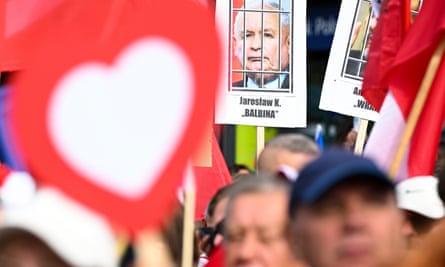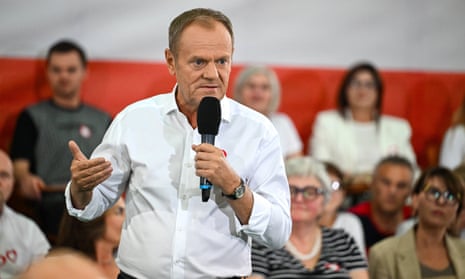“I want this message to reach everybody in Poland,” said Donald Tusk, speaking to a rally of supporters, gathered in a cavernous indoor sports arena in the city of Bydgoszcz. “This is really the last chance.”
As a vicious, bruising campaign comes to its climax ahead of parliamentary elections on 15 October, Tusk, a veteran of Polish and European politics, has sought to make this point with increasing urgency.
The rally was just one stop on a busy campaign trail for Tusk, whose Civic Coalition is seeking to prevent the nationalist, populist Law and Justice (PiS) government from winning a third term.
Crowds of local supporters queued to see Tusk in Bydgoszcz, and at least 2,000 packed the hall to hear him speak, waving Polish flags and applauding regularly. Tusk told them that the parliamentary vote would be a referendum – on Poland’s future as a state with democratic norms as well as on its place inside the EU.
“It will be crucial for Poland’s future, for the future of our children and grandchildren,” he said, to cheers from the loyal audience.
Tusk is perhaps Poland’s best-known politician internationally. He was prime minister between 2007 and 2014, when he left to become European Council president. A year later, his party suffered a surprise defeat in elections, with PiS coming to power.

Now, Tusk is back. He has run a slick campaign, designed to counter the stereotype that his is the party of the metropolitan elite. In Bydgoszcz, he referred to himself several times as a “normal person”, and frequently talked about his grandchildren. A campaign video shows him cheerfully boarding his campaign bus with a stack of takeaway pizza boxes to deliver to his aides. He is not a great orator, but appears very comfortable on stage and brings the gravitas of experience: he’s done the job before, after all.
His key foe in this battle is the other major figure of recent Polish politics, the PiS chair, Jarosław Kaczyński, who controls his party tightly in a largely behind-the-scenes role. PiS has used its eight years in power to try to reshape Poland, eroding democratic institutions, curtailing women’s rights and demonising migrants and minorities. It has clashed with Brussels over the rule of law, leading to tens of millions of euros of EU funds for Poland being blocked.
At the same time, the PiS government has introduced various policies that have increased welfare and social spending, winning them support among many who felt the years after the transition from communism were unfair.
Kaczyński is now fighting for another four years to continue implementing his vision for the transformation of Poland. His government has launched ferocious attacks on Tusk and his party, drawing from the populist playbook to claim the opposition represents foreign forces that want to subjugate Poland.
A large part of the PiS campaign has focused specifically on Tusk, with Kaczyński calling him “the personification of evil” earlier in the summer. Tusk is regularly accused of being a German or Russian agent on public television, which is staunchly pro-PiS.

Tusk has tried to portray himself as a patriot, coming up with a red-and-white heart as a campaign symbol and describing a huge march of supporters in Warsaw last weekend as the “march of a million hearts”.
“Tusk’s ambition is for the de-Pisification of Poland … but he is also fighting for his own legacy, for those years before 2015. He’s been smeared day and night for eight years,” said Jarosław Kuisz, the author of an upcoming book on recent Polish politics.
It has been the nastiest campaign most Poles can remember, and both sides have sought to portray a victory for the other as an apocalyptic scenario.
“I really think these elections are of historical importance,” said Adam Bodnar, a law professor who spent several years as Poland’s human rights ombudsman during PiS rule and who is now standing for election to the upper house of parliament as a Civil Coalition candidate in Warsaw.
“These elections won’t be fair, but there is still at least a chance to fight them and win … This is the last chance to stop the construction of a semi-authoritarian system.”
Most independent polls suggest the race is too close to call. A poll this week by the Kantar agency put PiS on 34% and Civic Coalition on 30%, meaning the ability to form the next government is likely to rest on the results of several smaller parties. One outcome is a hung parliament with no workable coalition possible, and the prospect of another election in the near future.
after newsletter promotion
The Kantar poll suggested that Civic Coalition, together with the leftwing Lewica and the centre-right Third Way, could put together a narrow parliamentary majority, but the margins are slim and the system used to translate votes into mandates is complicated, meaning there is still much uncertainty.
“I don’t remember a campaign where so much is unclear and the polls differ by such margins,” said Jacek Karnowski, the editor-in-chief of Sieci, a strongly pro-PiS weekly magazine. He said he was confident of a PiS victory.
The entire outcome could hinge on a few tenths of a per cent one way or the other for a smaller electoral grouping, such as Third Way, which has polled at about 8-10% over recent months. Third Way will make it into parliament only if it passes the threshold of 8%; if it falls below that, all its votes will be transferred to other parties, with a disproportionate amount going to the biggest party, likely to be PiS.

Lewica, Poland’s main leftwing force, is one of the other smaller parties to watch, along with Confederation, a grouping of libertarians and far-right nationalists that is far more extreme than PiS and opposes Poland’s backing for Ukraine. Both have won support among younger voters, although Confederation has fallen sharply in the polls since the summer and is now polling at about 8%.
Part of the attraction of these parties for younger Poles is that they seem more in tune with the concerns of the younger generation than the two main parties, led by ageing men – Tusk is 66 and Kaczyński is 74.
“Gen Z people are either frustrated and angry, or disengaged. They will tell you they’ve got nothing in common with either Kaczyński or Tusk,” said Weronika Sarnowska, a 31-year-old Lewica candidate in Warsaw. For most of those who do vote, “it’s a protest vote, an anti-duopoly vote”, she said.
Nevertheless, Lewica and Third Way are very clear that PiS is the greater threat. “We are not symmetrists, we don’t say both of them are evil, because the only evil one is PiS,” said Michał Kobosko, who is top of the Third Way party list for Warsaw.
If the opposition does well enough to install Tusk as prime minister, there will still be a difficult period of government ahead, as PiS has politicised many state institutions, and the PiS-allied president, Andrzej Duda, will have nearly two years of his term left with the ability to veto legislation.
There is also the possibility that the election will yield no clear result and lead to months of coalition wrangling and perhaps new elections. But if there is a path to a workable governing coalition for either PiS or Civil Coalition, the election may be the end for one of the two men who have dominated Polish politics for the past two decades.
“For Kaczyński, if PiS lose it would be very difficult to rebuild this system again later, and if Tusk is the clear loser it will be the end for him … This is their final battle,” said Karnowski.
Additional reporting by Katarzyna Piasecka
